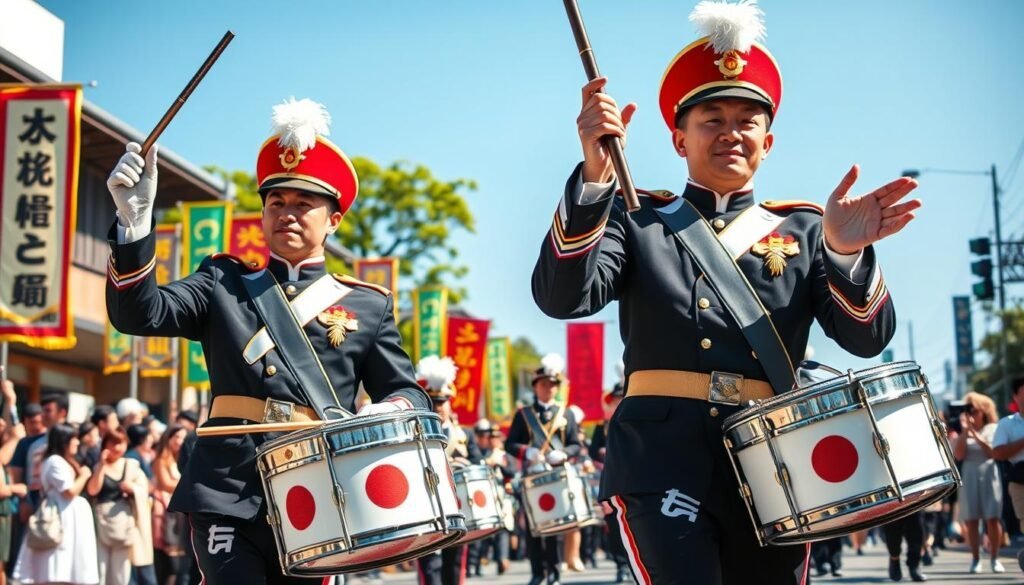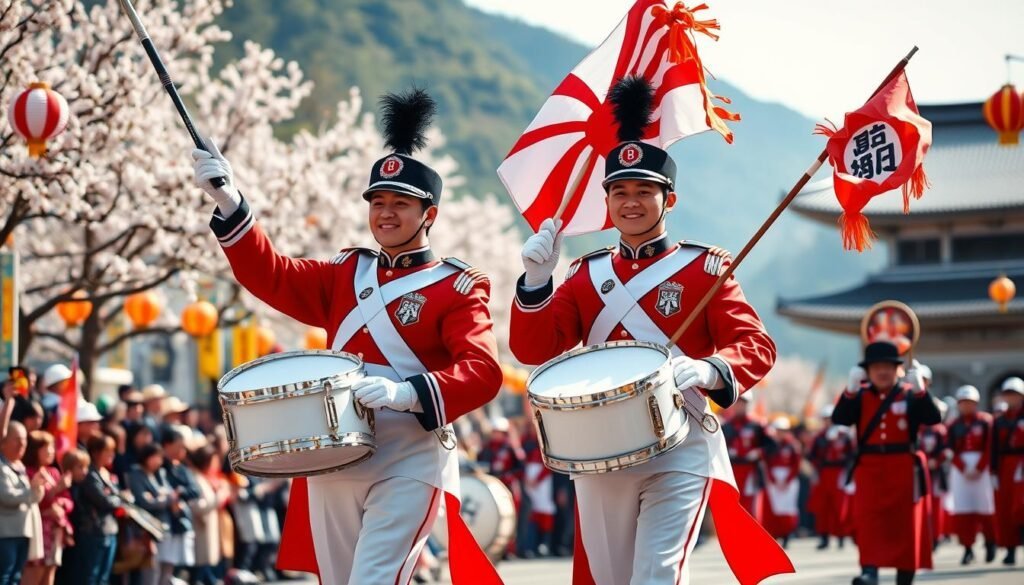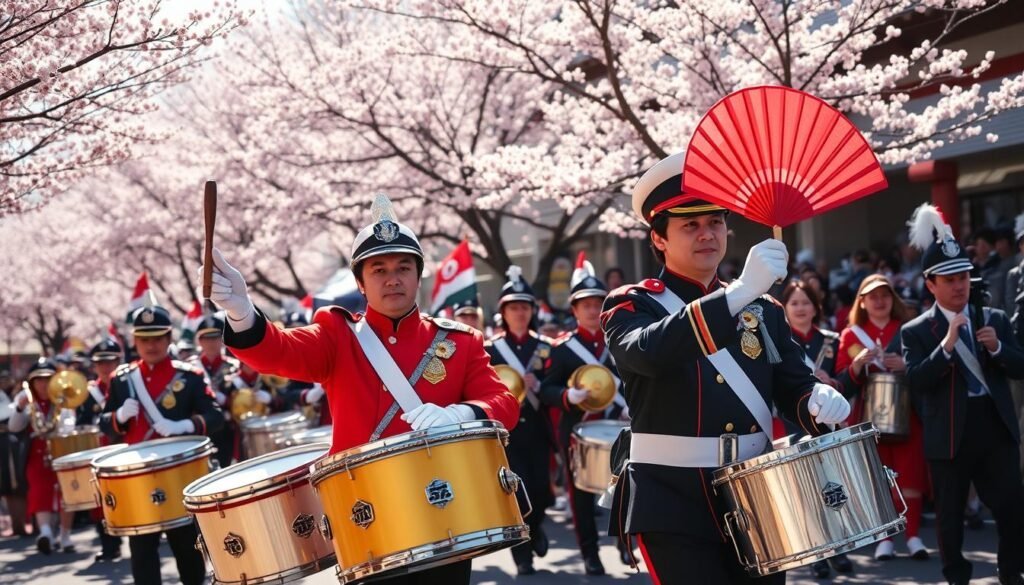
Why Japanese marching bands have two drum majors? This fascinating tradition, adopted by nearly 80% of Japanese bands, highlights a unique blend of cultural significance and functional efficiency. These bands achieve exceptional coordination with two drum majors, balancing traditional values with modern performance needs.
By exploring this unique system, you’ll uncover how it fosters teamwork, enhances community spirit, and makes Japanese marching bands stand out in music and performance.
Read Also: New World Aeternum US East Pangea Real-Time Trading Post | Best Market Insights 2025
Key Takeaways
- Approximately 80% of Japanese marching bands have two drum majors to promote effective leadership.
- The dual-drum central system helps in balancing responsibilities and performance dynamics.
- This practice is rooted in cultural values unique to Japan’s musical traditions.
- Japanese marching bands emphasize community engagement and teamwork through their structure.
- Understanding this system offers insight into broader cultural practices in Japanese society.
Understanding the Dual Drum Major System
The dual-drum central system is key to Japanese marching bands’ success. It uses a two-leader format, where both drum majors share duties. This setup promotes teamwork and lets each major showcase their strengths.
Overview of the Two-Leader Format
In this format, each drum major has specific roles. One leads the band in performances, ensuring rhythm and tempo. The other handles the visual aspects, like formations and movements. This division boosts the band’s performance under pressure.
Comparison with Other Marching Bands
The dual-drum central system stands out from other marching bands. Traditional bands rely on one leader, which can lead to communication issues. The Japanese system’s focus on two leaders leads to better decision-making and adaptability. It makes performances more dynamic and engaging for everyone.
The Cultural Significance of Two Drum Majors

Having two drum majors in Japanese marching bands reveals much about their culture. This tradition comes from a long history of teamwork and shared leadership in Japanese bands. These two leaders show the balance and values of Japanese society.
Historical Context in Japanese Band Traditions
The history of Japanese bands explains why they have two drum majors. Traditional music groups focus on working together and sharing tasks, and the two drum majors in marching bands follow this, promoting teamwork and respect.
Cultural Values Reflected in Band Dynamics
The way bands work together shows Japanese values like equality and teamwork. Every band member gets to show their skills in a supportive setting. The two drum majors model balance and cooperation, which are key values in Japan. Seeing this helps us understand the band’s spirit and performance.
Why Japanese Marching Bands Have Two Drum Majors

Japanese marching bands have two drum majors for a good reason. This leadership distribution in Japanese bands makes the band more effective. It also makes the experience better for the musicians.
Leadership Distribution and Responsibilities
The two drum majors share responsibilities in a balanced way. One might handle the music, while the other focuses on the visual aspects. This setup helps musicians get guidance in different areas, strengthening their marching band leadership roles.
Enhanced Communication During Performances
Two drum majors improve communication during performances. They can make decisions quickly and give clear directions, helping the band stay together, even in complex routines. Their teamwork creates a supportive environment. Musicians can do their best, knowing everyone is on the same page.
Unique Roles of Drum Majors in Japan
In Japanese marching bands, drum majors play a key role. They handle logistics, leadership, and artistic direction. Each drum major has unique tasks that help the band work together well.
Distinct Functions of Each Drum Major
Drum majors have different jobs to manage the band’s complex needs. One might lead the music, keeping everyone in sync. They talk directly to musicians to control the tempo and volume. The other drum major focuses on logistics. They make sure everyone moves together smoothly and rehearsals are efficient.
Collaboration and Synchronization Strategies
Japanese marching bands rely on teamwork to excel. Drum majors often meet to share their vision. They use:
These strategies help drum majors work better together, leading to better performances and demonstrating the band’s teamwork.
Drum Major Traditions in Japan
The role of the drum major in Japanese marching bands has evolved. This evolution shows how Japanese culture and Asian drum major traditions blend. It is fascinating to see how this role has grown even as society and art change.
Evolution of the Drum Major Role
In Japan, drum major traditions have found a balance between old and new. Starting from Western military customs, the role has taken on local traditions. Now, drum majors lead, communicate, and coordinate performances.
Influences of Asian Drum Major Culture
Asian cultures have greatly influenced Japan’s drum major traditions. Techniques and styles from nearby countries have enriched Japanese bands, demonstrating the value of teamwork and respect for leadership in these traditions.
Challenges of the Dual Drum Major System
Starting a dual drum central system can be challenging for a marching band. Leaders and band members must be aware of these challenges. One big problem is when leaders step on each other’s toes, causing confusion and disagreements.
Potential Overlap in Leadership Roles
Having two drum majors can make it hard to decide who does what. They might want the same things for the band, leading to confusion. Clear roles are essential to avoid misunderstandings and keep things running smoothly.
Training and Coordination for Drum Majors
Drum majors need good training to handle dual leadership well. When both are trained together, the band moves better as one. They should learn not just how to lead but how to work together as a team.
This teamwork helps solve problems caused by too much overlap. It also lets both drum majors lead effectively, strengthening the band.
Conclusion
The importance of Japanese marching bands goes beyond their performances. It’s about their unique dual drum central system, which helps lead and bring the band together.
This system makes sure everyone knows their role. It also helps in clear communication during complex shows.
The dual-drum central system is all about teamwork and respect. It shows the values of Japanese culture. Understanding this makes us appreciate the hard work and talent in these bands.
This journey into Japanese marching bands has given us a glimpse into their culture. Their traditions and unique qualities show the beauty of music and teamwork and remind us of the power of cultural expression.
Frequently Asked Questions
Why do Japanese marching bands have two drum majors?
Japanese marching bands have two drum majors to improve leadership and communication. This setup helps the band perform better together and shows the importance of teamwork and equality in Japanese culture.
What are the unique roles of each drum major in Japanese bands?
Each drum major in Japanese bands has a task. One focuses on logistics, while the other guides the artistic side. This way, the band can meet its diverse needs and perform smoothly.
How does the dual drum central system compare with other marching bands?
Japanese bands use two drum majors, unlike Western bands, which have just one. This system helps the band work together better and promotes a shared leadership approach.
What challenges does the dual drum central system present?
The system of two drum majors can cause leadership confusion. But with proper training and teamwork, these issues can be overcome, ensuring the drum majors work well together.
How does the dual drum central system reflect cultural values in Japan?
Using two drum majors reflects Japan’s teamwork, respect, and shared responsibility values. It helps the band members work together and mirrors Japan’s societal norms.
What historical context underlies the tradition of having two drum majors?
The tradition of two drum majors in Japanese bands has deep roots. These roots have shaped the roles of drum majors. They are key to Japanese band culture.
Are there specific training programs for drum majors in Japan?
Yes, Japan has special training for drum majors. These programs focus on coordination, performance, and teamwork. They help drum majors lead the band well.
How does having two drum majors influence student engagement in bands?
Having two drum majors makes bands more engaging for students. It offers more chances for leadership and helps drum majors connect with the band. It boosts performance and fosters friendship among musicians.
Muhammad Naeem is a professional blogger and SEO consultant with expertise in creating high-quality content and optimizing websites for search engines with a passion for driving organic growth. As a blogging enthusiasts, we’re passionate about sparking conversations, fostering connections, and inspiring change through diverse perspectives.





